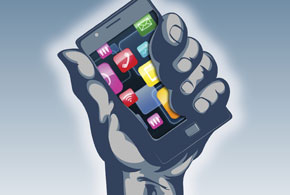Mobile technology is redefining and rewiring countless fields. It’s crumpling paper and ushering in far greater efficiencies.
At Dominium, a Plymouth, Minn. firm that builds and manages affordable apartments nationally, the need to take the business into the 21st century was essential. The company manages more than 25,000 apartments in 23 states, with a professional staff of more than 1,000 employees.
“This industry always seems to lag other industries in technology adoption,” says Jim Mitchell, director of maintenance and purchasing for Dominium, which oversees upward of $2.2 billion in properties. “We want to distinguish the company as a provider of excellent customer service. We want to stand out from the rest of the pack and drive higher levels of customer retention.”
In the past, Dominium largely relied on paper trails and manual processes to handle field tasks. Although the company distributed PDF files to employees, they had to print them and submit paperwork back to the office. This included residential inspection forms used to initiate repairs and prepare apartments for new renters.
“It was extremely difficult to measure an employee’s performance in the field and ensure that jobs were taking place in a timely and efficient manner,” Mitchell recalls.
Mitchell researched several vendors and their devices. “We looked at consumer-grade units, but they didn’t offer the administrative controls and durability we required,” he says, adding that he wanted to deploy devices that wouldn’t accommodate consumer apps and pose unnecessary security risks.
Building a Real-Time Business Framework
In 2015, the company decided on Zebra hardware and began beta testing the rugged, pocket-size Zebra TC55 mobile computers and specialized proprietary software. In late 2016, it went live with a system that allows employees to check boxes and drop-down menus for input, and then send reports into headquarters wirelessly.
“This allowed us to build a real-time business framework,” Mitchell explains.
The initiative has shredded stacks of paper while streamlining workflows. “People no longer have to deal with multiple copies of paperwork, take manual notes and copy over information when they got back to the office,” Mitchell points out.
In addition, employees in the field can use the mobile devices to scan barcodes for assets in apartments. “This serves two purposes,” he says. “First, we can verify that the inspection was performed correctly. Second, we can identify appliances, sinks, smoke detectors and other items, and can determine when they are reaching the end of their lifespan.”
In fact, Dominium now saves 22 minutes per residential inspection, which equates to about $525,000 in annual efficiency gains. No less important is the fact that the firm can better track the performance of field employees and understand how much time they devote to various tasks.
Finally, the company can better determine when to charge residents for any damage they caused. As a result, the system has boosted chargebacks by about 60 percent.
The biggest challenge, Mitchell says, was the cultural aspect. “We have a lot of talented people who do an excellent job, and some of them initially resisted using the technology,” he reports. To handle this challenge, Dominium eliminated the option of using paper and provided training for the mobile devices. Since then, the system has flourished.
“Once people began working with the devices, we started receiving feedback about how cool the technology is and how much it helps them get their work done,” Mitchell concludes. “We’ve taken a big step forward.”










